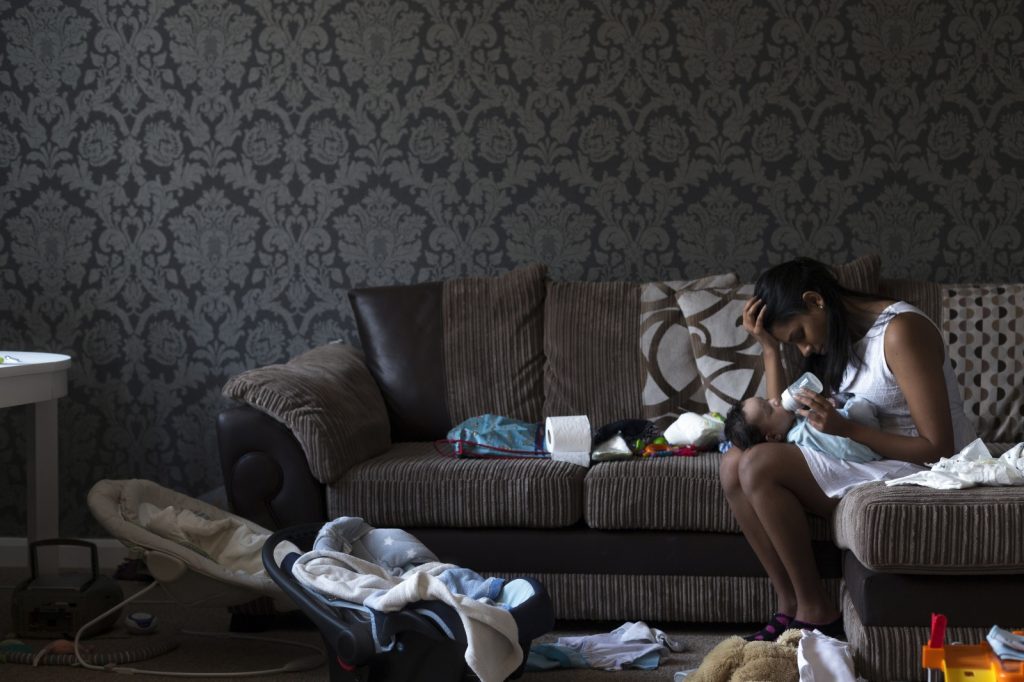 My husband and I just welcomed the birth of our first baby a few months ago. Even though I’m so happy we have a baby and I always wanted to be a mom, I have never been so tired in my life. Sometimes I feel anxious and I can’t sleep because my mind is racing through all the things I have to do. Sometimes I feel sad and lonely and I cry at least once a day. The first weeks home with our baby were wonderful, but now I’m really struggling. Why am I feeling worse now? Is there something wrong with me?
My husband and I just welcomed the birth of our first baby a few months ago. Even though I’m so happy we have a baby and I always wanted to be a mom, I have never been so tired in my life. Sometimes I feel anxious and I can’t sleep because my mind is racing through all the things I have to do. Sometimes I feel sad and lonely and I cry at least once a day. The first weeks home with our baby were wonderful, but now I’m really struggling. Why am I feeling worse now? Is there something wrong with me?
There is absolutely nothing wrong with you and you are not alone in your suffering.
The months surrounding the birth of a baby are the most vulnerable time for moms, and the difficult experiences you are describing are more common that most people realize — studies show that nearly one in five postpartum women meet the criteria for what is known a perinatal distress: postpartum depression, postpartum anxiety, postpartum obsessive compulsive disorder, and postpartum adjustment disorder. Although baby blues is short-lived and mild, postpartum depression usually emerges one to three months after childbirth and is persistently distressing.
But the good news is that, with treatment, what you are facing can get better.
The experienced counselors at Emily Cook Therapy often collaborate with local professionals whose work complements the psychotherapy services we offer for newlyweds and new parents, including individual counseling, couples therapy, family therapy, and Mama Groove (a support group that includes movement and dance with your baby).
We recently had the great honor to meet Harita Raja, MD, a reproductive psychiatrist and owner of Bethesda Women’s Mental Health, and we invited her to answer a few questions about her important work with prenatal and postpartum women:
Tell us about your perinatal specialty — what makes you unique among local psychiatrists?
“I am a reproductive psychiatrist and specialize in women’s mental health. I am lucky to have found a niche in psychiatry that I truly love. My expertise allows me to thoughtfully integrate physical and mental health care. I am especially able to address the implications of hormonal transitions, including the menstrual cycle, pregnancy and menopause, through a women’s lifespan. My understanding of the scientific data allows me to educate my patents about the true risks and benefits of my recommended treatments. I spend a significant amount of time getting to know my patients as individuals, thus allowing me to provide them with individualized treatment plans.”
Why do you consider the mental health of pregnant and postpartum women to be so important?
“Pregnancy was initially thought to be a protective time for women and their mental health. Unfortunately, it has become clearer that the pregnancy and postpartum periods are more vulnerable. Studies have shown up to 20% of women will suffer from depression and/or anxiety during the peripartum period. The consequences of untreated mental illness are significant and widespread. Through treatment, we are able to alleviate symptoms for mom, allowing her to be more present as a mother and wife. In turn, we are able to improve bonding with the baby, preserve marriages and decrease symptoms in children. The positive consequences are staggering. There is much misinformation regarding the safety of medications in pregnancy. However, it is important to weigh the risks and benefits as there are medications that can be more safe in pregnancy and mental illness in pregnancy is not benign; it can have significant consequences as well.”
How does psychotherapy, from an individual counselor or a marriage therapist, benefit your patients and complement your practice?
“Psychotherapy is an essential component of treatment. Medications have an important place in treatment, though they are not recommended for everyone. Also, they are not “magic pills” that improve all symptoms. Studies have shown that psychotherapy is just as effective as medication for mild depression and anxiety. With more severe symptoms, the addition of psychotherapy provides additional benefits. Therefore, all of my patients are encouraged to utilize this treatment. I find that collaborating with my fellow treatment providers is invaluable. Most importantly, our patients benefit tremendously.”
Harita Raja,  MD is a board certified psychiatrist who specializes in women’s mental health. She is a reproductive psychiatrist, which means that she understands the intricacies of psychiatric problems that occur before, during and after pregnancy, and their treatments. She also has expertise in the hormonal changes that occur from menses to menopause. Dr. Raja founded Bethesda Women’s Mental Health to provide women with a place to obtain compassionate and knowledgeable psychiatric care. She works closely with her patients, their loved ones, and their providers to find the best treatment plan.
MD is a board certified psychiatrist who specializes in women’s mental health. She is a reproductive psychiatrist, which means that she understands the intricacies of psychiatric problems that occur before, during and after pregnancy, and their treatments. She also has expertise in the hormonal changes that occur from menses to menopause. Dr. Raja founded Bethesda Women’s Mental Health to provide women with a place to obtain compassionate and knowledgeable psychiatric care. She works closely with her patients, their loved ones, and their providers to find the best treatment plan.
